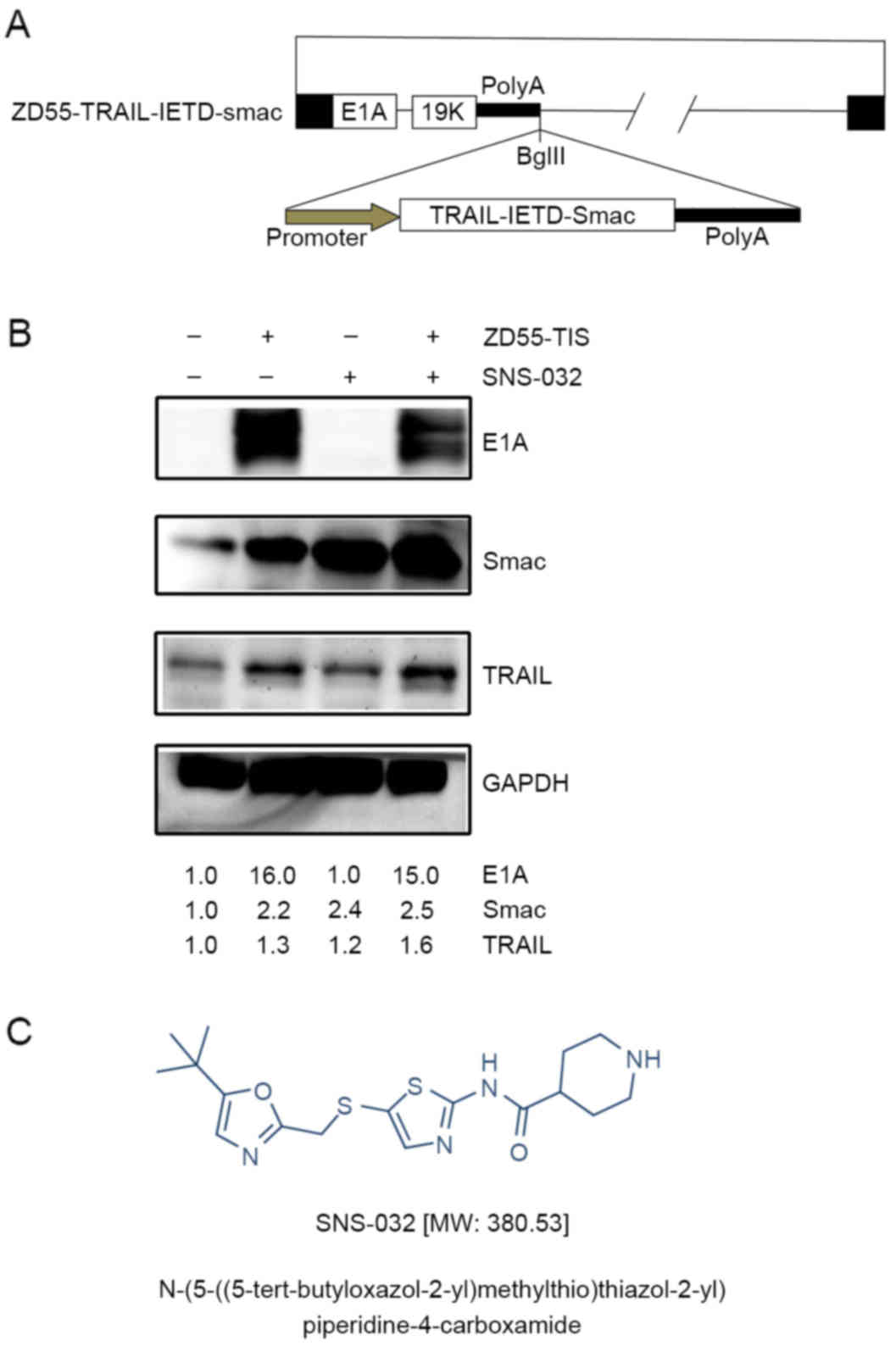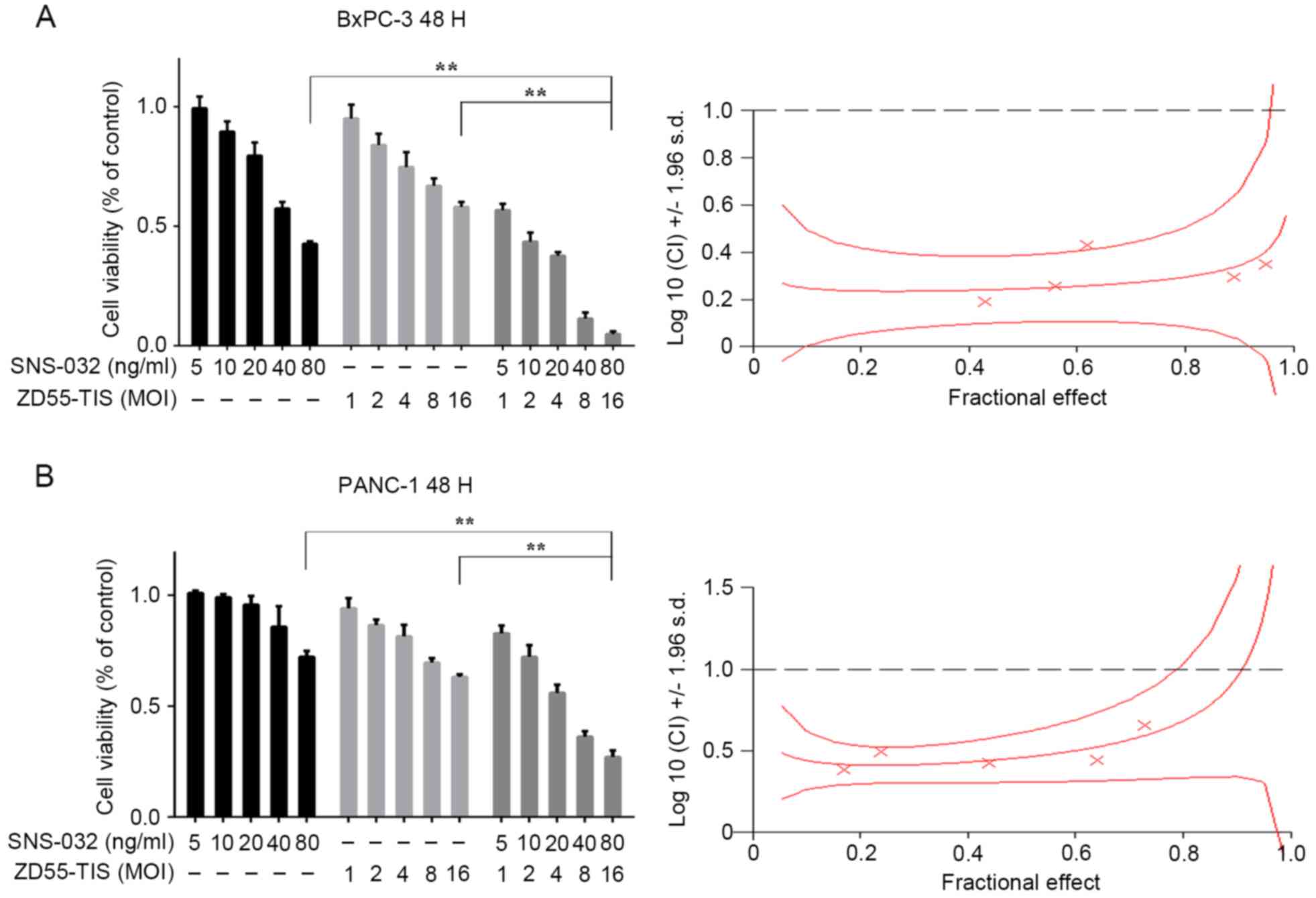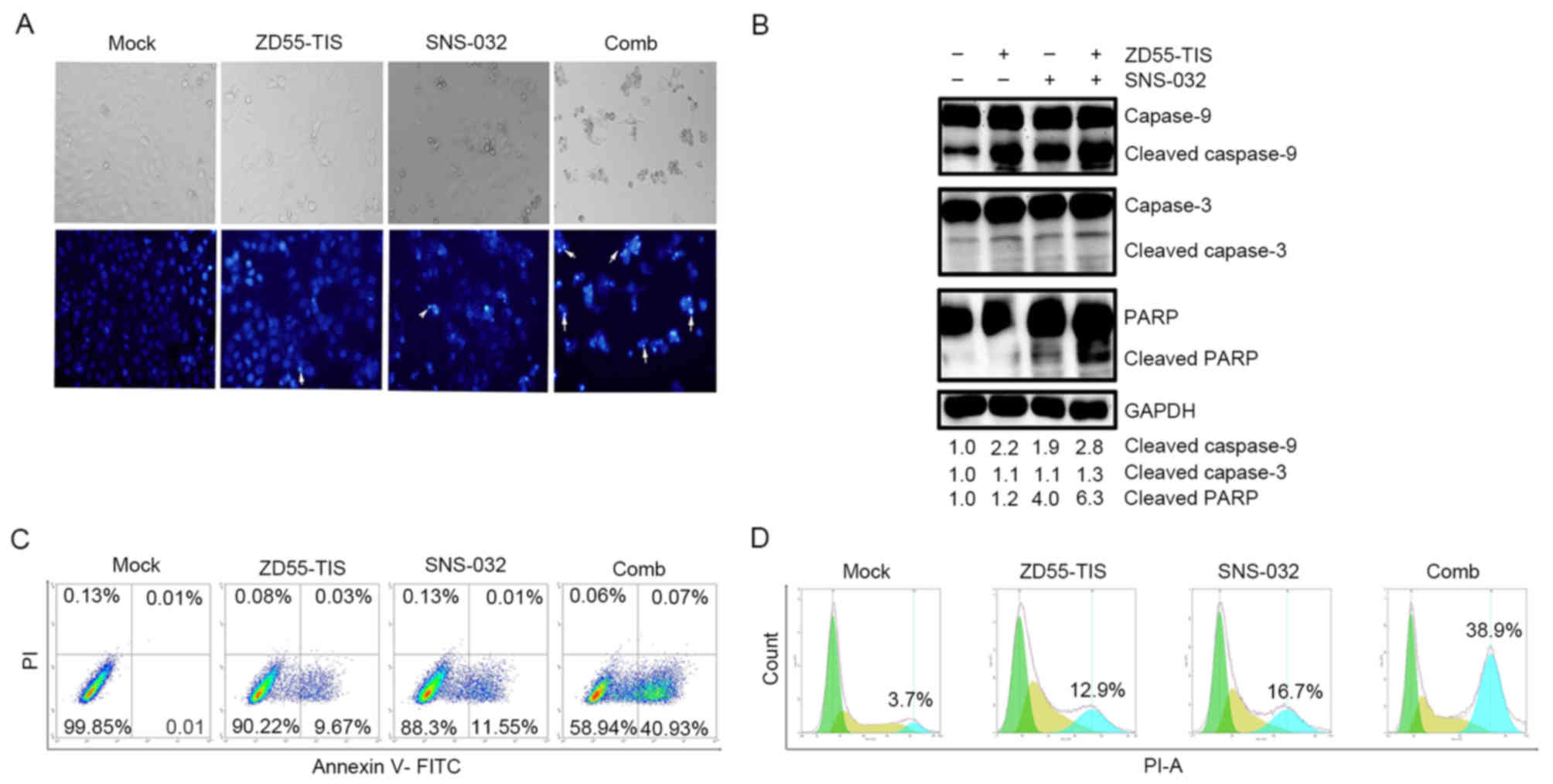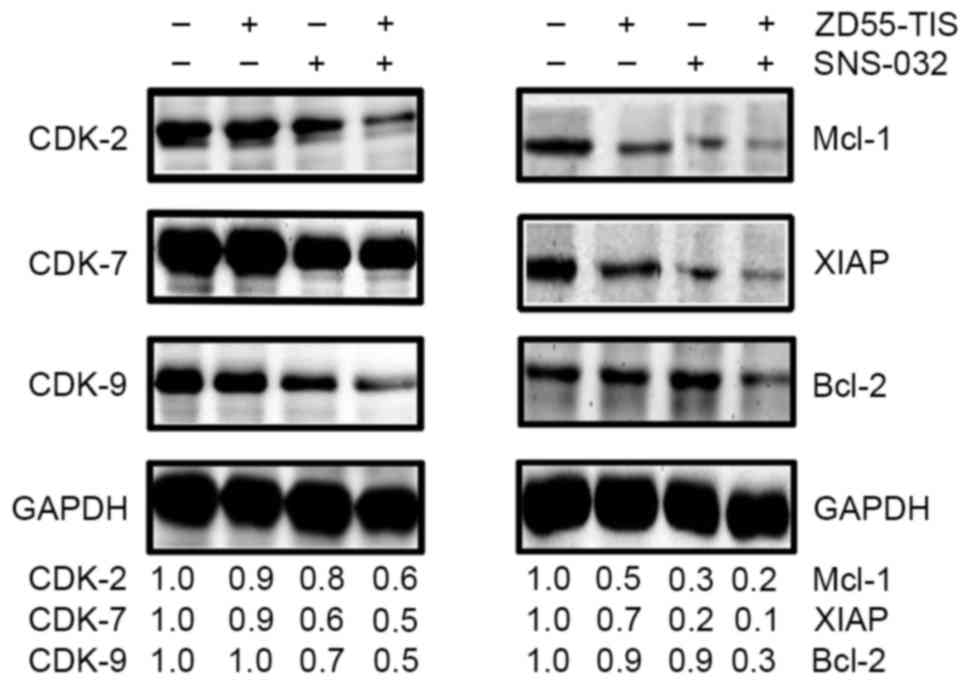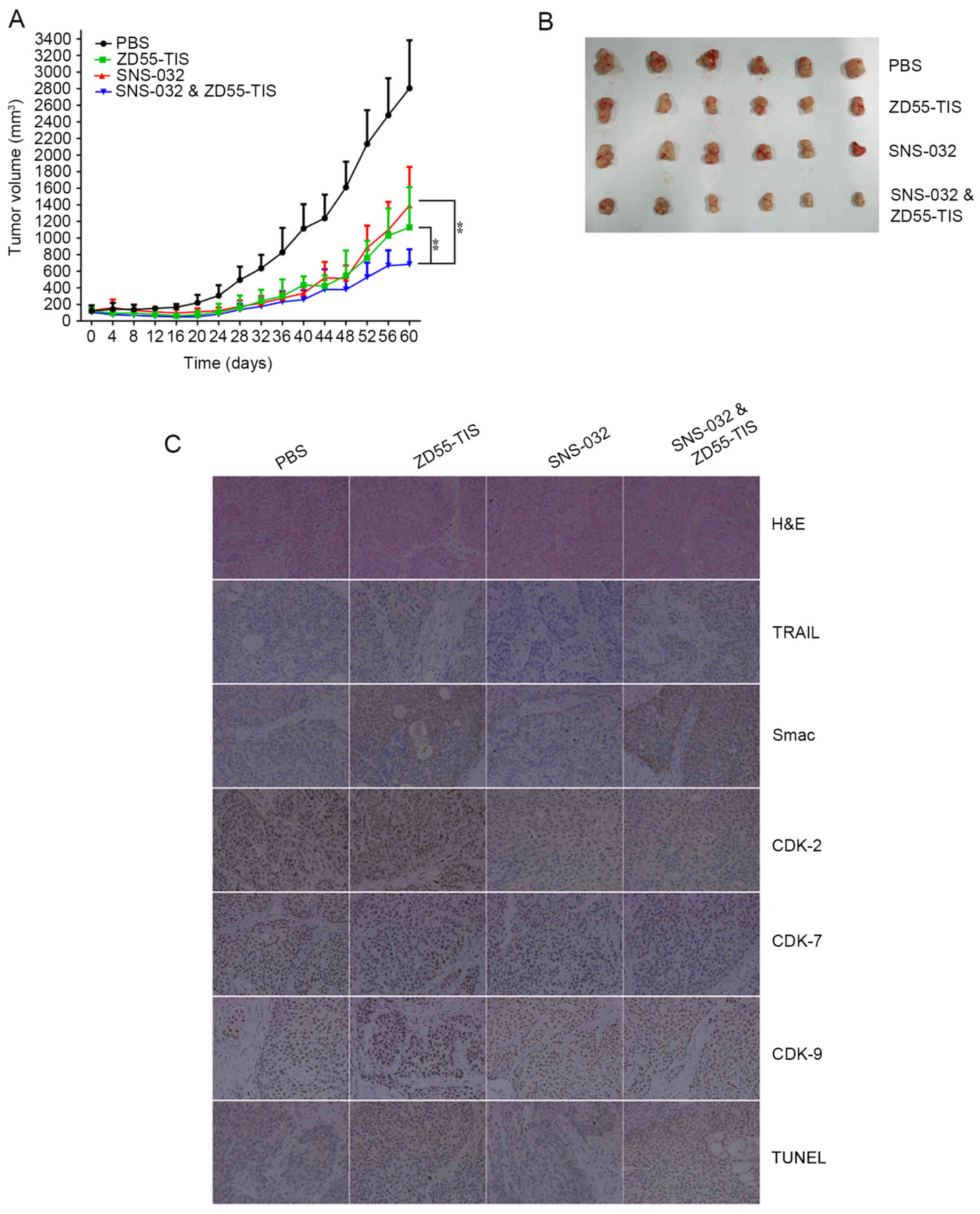|
1
|
Jemal A, Siegel R, Xu J and Ward E: Cancer
statistics, 2010. CA Cancer J Clin. 60:277–300. 2010. View Article : Google Scholar : PubMed/NCBI
|
|
2
|
Burris H and Storniolo AM: Assessing
clinical benefit in the treatment of pancreas cancer: Gemcitabine
compared to 5-fluorouracil. Eur J Cancer. 33 Suppl 1:S18–S22. 1997.
View Article : Google Scholar : PubMed/NCBI
|
|
3
|
Cheng AL, Hsu CH, Lin JK, Hsu MM, Ho YF,
Shen TS, Ko JY, Lin JT, Lin BR, Ming-Shiang W, et al: Phase I
clinical trial of curcumin, a chemopreventive agent, in patients
with high-risk or pre-malignant lesions. Anticancer Res.
21:2895–2900. 2001.PubMed/NCBI
|
|
4
|
Lei W, Liu HB, Wang SB, Zhou XM, Zheng SD,
Guo KN, Ma BY, Xia YL, Tan WS, Liu XY and Wang YG: Tumor suppressor
in lung cancer-1 (TSLC1) mediated by dual-regulated oncolytic
adenovirus exerts specific antitumor actions in a mouse model. Acta
Pharmacol Sin. 34:531–540. 2013. View Article : Google Scholar : PubMed/NCBI
|
|
5
|
Hermiston TW and Kuhn I: Armed therapeutic
viruses: Strategies and challenges to arming oncolytic viruses with
therapeutic genes. Cancer Gene Ther. 9:1022–1035. 2002. View Article : Google Scholar : PubMed/NCBI
|
|
6
|
Zhang ZL, Zou WG, Luo CX, Li BH, Wang JH,
Sun LY, Qian QJ and Liu XY: An armed oncolytic adenovirus system,
ZD55-gene, demonstrating potent antitumoral efficacy. Cell Res.
13:481–489. 2003. View Article : Google Scholar : PubMed/NCBI
|
|
7
|
Dong F, Wang L, Davis JJ, Hu W, Zhang L,
Guo W, Teraishi F, Ji L and Fang B: Eliminating established tumor
in nu/nu nude mice by a tumor necrosis factor-alpha-related
apoptosis-inducing ligand-armed oncolytic adenovirus. Clin Cancer
Res. 12:5224–5230. 2006. View Article : Google Scholar : PubMed/NCBI
|
|
8
|
Qian W, Liu J, Tong Y, Yan S, Yang C, Yang
M and Liu X: Enhanced antitumor activity by a selective
conditionally replicating adenovirus combining with
MDA-7/interleukin-24 for B-lymphoblastic leukemia via induction of
apoptosis. Leukemia. 22:361–369. 2008. View Article : Google Scholar : PubMed/NCBI
|
|
9
|
Pan QW, Zhong SY, Liu BS, Liu J, Cai R,
Wang YG, Liu XY and Qian C: Enhanced sensitivity of hepatocellular
carcinoma cells to chemotherapy with a Smac-armed oncolytic
adenovirus. Acta Pharmacol Sin. 28:1996–2004. 2007. View Article : Google Scholar : PubMed/NCBI
|
|
10
|
Li J, Bonifati S, Hristov G, Marttila T,
Valmary-Degano S, Stanzel S, Schnölzer M, Mougin C, Aprahamian M,
Grekova SP, et al: Synergistic combination of valproic acid and
oncolytic parvovirus H-1PV as a potential therapy against cervical
and pancreatic carcinomas. EMBO Mol Med. 5:1537–1555. 2013.
View Article : Google Scholar : PubMed/NCBI
|
|
11
|
Wang SB, Tan Y, Lei W, Wang YG, Zhou XM,
Jia XY, Zhang KJ, Chu L, Liu XY and Qian WB: Complete eradication
of xenograft hepatoma by oncolytic adenovirus ZD55 harboring
TRAIL-IETD-Smac gene with broad antitumor effect. Hum Gene Ther.
23:992–1002. 2012. View Article : Google Scholar : PubMed/NCBI
|
|
12
|
Senderowicz AM: Inhibitors of
cyclin-dependent kinase modulators for cancer therapy. Prog Drug
Res. 63:183–206. 2005. View Article : Google Scholar : PubMed/NCBI
|
|
13
|
Dickson MA and Schwartz GK: Development of
cell-cycle inhibitors for cancer therapy. Curr Oncol. 16:36–43.
2009.PubMed/NCBI
|
|
14
|
Meng H, Jin Y, Liu H, You L, Yang C, Yang
X and Qian W: SNS-032 inhibits mTORC1/mTORC2 activity in acute
myeloid leukemia cells and has synergistic activity with perifosine
against Akt. J Hematol Oncol. 6:182013. View Article : Google Scholar : PubMed/NCBI
|
|
15
|
Wu Y, Chen C, Sun X, Shi X, Jin B, Ding K,
Yeung SC and Pan J: Cyclin-dependent kinase 7/9 inhibitor SNS-032
abrogates FIP1-like-1 platelet-derived growth factor receptor a and
bcr-abl oncogene addiction in malignant hematologic cells. Clin
Cancer Res. 18:1966–1978. 2012. View Article : Google Scholar : PubMed/NCBI
|
|
16
|
Walsby E, Lazenby M, Pepper C and Burnett
AK: The cyclin-dependent kinase inhibitor SNS-032 has single agent
activity in AML cells and is highly synergistic with cytarabine.
Leukemia. 25:411–419. 2012. View Article : Google Scholar
|
|
17
|
Xie G, Tang H, Wu S, Chen J, Liu J and
Liao C: The cyclin-dependent kinase inhibitor SNS-032 induces
apoptosis in breast cancer cells via depletion of Mcl-1 and
X-linked inhibitor of apoptosis protein and displays antitumor
activity in vivo. Int J Oncol. 45:804–812. 2014.PubMed/NCBI
|
|
18
|
Feldmann G, Mishra A, Bisht S, Karikari C,
Garrido-Laguna I, Rasheed Z, Ottenhof NA, Dadon T, Alvarez H,
Fendrich V, et al: Cyclin-dependent kinase inhibitor Dinaciclib
(SCH727965) inhibits pancreatic cancer growth and progression in
murine xenograft models. Cancer Biol Ther. 12:598–609. 2011.
View Article : Google Scholar : PubMed/NCBI
|
|
19
|
Walczak H, Miller RE, Ariail K, Gliniak B,
Griffith TS, Kubin M, Chin W, Jones J, Woodward A, Le T, et al:
Tumoricidal activity of tumor necrosis factor-related
apoptosis-inducing ligand in vivo. Nat Med. 5:157–163. 1999.
View Article : Google Scholar : PubMed/NCBI
|
|
20
|
Chai J, Shiozaki E, Srinivasula SM, Wu Q,
Datta P, Alnemri ES and Shi Y: Structural basis of caspase-7
inhibition by XIAP. Cell. 104:769–780. 2001. View Article : Google Scholar : PubMed/NCBI
|
|
21
|
Suzuki Y, Nakabayashi Y, Nakata K, Reed JC
and Takahashi R: X-linked inhibitor of apoptosis protein (XIAP)
inhibits caspase-3 and −7 in distinct modes. J Biol Chem.
276:27058–27063. 2001. View Article : Google Scholar : PubMed/NCBI
|
|
22
|
Tamm I, Kornblau SM, Segall H, Krajewski
S, Welsh K, Kitada S, Scudiero DA, Tudor G, Qui YH, Monks A, et al:
Expression and prognostic significance of IAP-family genes in human
cancers and myeloid leukemias. Clin Cancer Res. 6:1796–1803.
2000.PubMed/NCBI
|
|
23
|
Ambrosini G, Adida C and Altieri DC: A
novel anti-apoptosis gene, survivin, expressed in cancer and
lymphoma. Nat Med. 3:917–921. 1997. View Article : Google Scholar : PubMed/NCBI
|
|
24
|
Srinivasula SM, Hegde R, Saleh A, Datta P,
Shiozaki E, Chai J, Lee RA, Robbins PD, Fernandes-Alnemri T, Shi Y
and Alnemri ES: A conserved XIAP-interaction motif in caspase-9 and
Smac/DIABLO regulates caspase activity and apoptosis. Nature.
410:112–116. 2001. View
Article : Google Scholar : PubMed/NCBI
|
|
25
|
Pei Z, Chu L, Zou W, Zhang Z, Qiu S, Qi R,
Gu J, Qian C and Liu X: An oncolytic adenoviral vector of Smac
increases antitumor activity of TRAIL against HCC in human cells
and in mice. Hepatology. 39:1371–1381. 2004. View Article : Google Scholar : PubMed/NCBI
|
|
26
|
Levinson AD: Cancer therapy reform.
Science. 328:1372010. View Article : Google Scholar : PubMed/NCBI
|
|
27
|
Ehrhardt H, Häcker S, Wittmann S, Maurer
M, Borkhardt A, Toloczko A, Debatin KM, Fulda S and Jeremias I:
Cytotoxic drug-induced, p53-mediated upregulation of caspase-8 in
tumor cells. Oncogene. 27:783–793. 2008. View Article : Google Scholar : PubMed/NCBI
|
|
28
|
Chu RL, Post DE, Khuri FR and Van Meir EG:
Use of replicating oncolytic adenoviruses in combination therapy
for cancer. Clin Cancer Res. 10:5299–5312. 2004. View Article : Google Scholar : PubMed/NCBI
|
|
29
|
Kruyt FA and Curiel DT: Toward a new
generation of conditionally replicating adenoviruses: Pairing tumor
selectivity with maximal oncolysis. Hum Gene Ther. 13:485–495.
2002. View Article : Google Scholar : PubMed/NCBI
|
|
30
|
Post DE, Khuri FR, Simons JW and Van Meir
EG: Replicative oncolytic adenoviruses in multimodal cancer
regimens. Hum Gene Ther. 214:933–946. 2003. View Article : Google Scholar
|
|
31
|
Libertini S, Iacuzzo I, Ferraro A, Vitale
M, Bifulco M, Fusco A and Portella G: Lovastatin enhances the
replication of the oncolytic adenovirus dl1520 and its
antineoplastic activity against anaplastic thyroid carcinoma cells.
Endocrinology. 148:5186–5194. 2007. View Article : Google Scholar : PubMed/NCBI
|
|
32
|
Pan JJ, Zhang SW, Chen CB, Xiao SW, Sun Y,
Liu CQ, Su X, Li DM, Xu G, Xu B and Lu YY: Effect of recombinant
adenovirus-p53 combined with radiotherapy on long-term prognosis of
advanced nasopharyngeal carcinoma. J Clin Oncol. 27:799–804. 2009.
View Article : Google Scholar : PubMed/NCBI
|
|
33
|
Subramaniam D, Periyasamy G, Ponnurangam
S, Chakrabarti D, Sugumar A, Padigaru M, Weir SJ, Balakrishnan A,
Sharma S and Anant S: CDK-4 inhibitor P276 sensitizes pancreatic
cancer cells to gemcitabine-induced apoptosis. Mol Cancer Ther.
11:1598–1608. 2012. View Article : Google Scholar : PubMed/NCBI
|
|
34
|
Hu C, Dadon T, Chenna V, Yabuuchi S,
Bannerji R, Booher R, Strack P, Azad N, Nelkin BD and Maitra A:
Combined inhibition of cyclin-dependent kinases (Dinaciclib) and
AKT (MK-2206) blocks pancreatic tumor growth and metastases in
patient-derived xenograft models. Mol Cancer Ther. 14:1532–1539.
2015. View Article : Google Scholar : PubMed/NCBI
|















